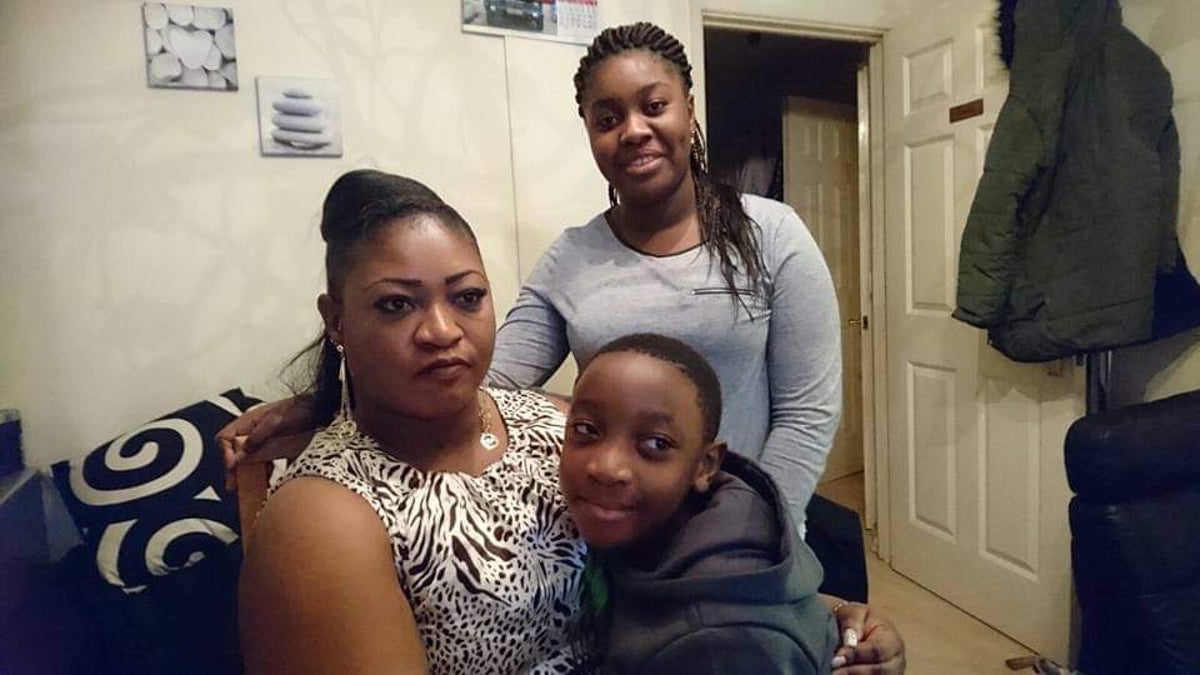
A mother-of-two has been left “at a standstill” by the Home Office while waiting over two years for leave to remain in the UK.
Rosina Davis, 43, a Ghanian national, is unable to leave the country because of the delay, which has left her feeling “isolated and stuck”. She has also struggled to find employment, despite being legally entitled to work, because she doesn’t have a physical visa document.
Ms Davis first applied for the right to live in the UK in 2013 and she has had limited periods of leave-to-remain granted twice already. But she has now been waiting since May 2020 to get her visa renewed – after it ran out on 13 June 2020.
The average waiting time for a decision is 11 months, according to the government, but Ms Davis has now waited 30 months. The government does not publish data on how long people are waiting for a further leave to remain (FLTR) decision, but it does collect data on it’s “super priority” route – which promises to get a decision made by the end of the next working day.
This data shows that from April 2021 to April 2022 the number of people who got a decision outside the “service standard” increased from 35 to 263.
The charity Refugee and Migrant Forum of Essex & London, who are supporting Ms David, said that they submitted 95 FLTR applications between June 2021 and February 2022. Of these 82 per cent – 78 applicants – have waited more than 10 months for a decision.
In 2020, the charity submitted 31 applications and 16 per cent of those waited more than 10 months for a decision.
Ms Davis, who has experience working as a carer, would like to one day go into further education and train to become a nurse. However, without indefinite leave to remain in the UK, she cannot afford to pursue her ambitions.
She is on “3C Leave” while her application is being processed. This status protects her current rights to work and claim benefits, but leaves her without a physical document confirming her status – something many employers insist on seeing. Some 372,000 people were in the same position during 2019, the latest Home Office figures show.

Ms Davis said she felt like her life was at a standstill, adding: “You are in some kind of box on your own, boxed in on your own. You just turn around and there is nowhere to come out. You are stuck in one place and there is not much you can do.”
Ms Davis lives in Enfield with her 12-year-old son Jesse and 22-year-old daughter Austina, who are both British nationals.
She arrived in the UK some 20 years ago on a spouse visa and was working as a healthcare assistant before Covid.
She was forced to isolate with her son during the pandemic as they both have sickle cell disease, a condition that makes them clinically extremely vulnerable to the virus.

After the pandemic, she tried to find new work in the care sector but her visa had run out and the Home Office has not issued her a new one. “A lot of companies wanted to take me on but they wanted my visa, which I didn’t have,” she said.
Nick Beales, head of campaigning at the charity Ramfel, which is supporting Ms David, said that her application had been delayed for “an exceptionally long time”.

“Home Office decision-making times have normalised a year-long wait for a simple visa extension to be processed. During this period, people remain lawfully resident and entitled to work, but as their visa document has expired face all sorts of issues retaining and accessing employment,” he said.
Ramfel, which supports refugees and migrants in Essex and London, has seen seven people in the same position as Ms Davis in 2022. “They have been wrongly suspended from their jobs due to their employers’ misunderstanding their immigration status,” Mr Beales explained.
He added: “The excessive delays in processing further leave to remain applications are directly contributing to this, yet the government seems unwilling to acknowledge and address the problem.”
Between January 2020 and May 2022, Ramfel helped 329 people make further leave to remain applications. In at least 109 instances – 31 per cent – clients face some kind of detriment while waiting for a decision. These included being threatened with having their employment suspended and being wrongly denied access to benefits.
Twenty one people were either wrongly suspended from work or prevented from taking up employment.
A Home Office spokesperson said that their guidance “clearly stipulated that employers should provide individuals with every opportunity to demonstrate their right to work”.
Employers “must not discriminate against those with an outstanding application”, they continued.
Eventually, in May 2022, a friend of Ms Davis introduced her to a security agency that would take her on.
She now works as a security officer on different commercial sites but hopes that one day she can study and get a better job.

Without her leave to remain, she has also been unable to leave the country – for fear of not being able to return. Her son Jesse has been asking her why they can’t go on holidays like his other friends from school.
“His friends are travelling and he has been asking ‘Why can’t we go anywhere?’”, she said.
“If I had leave to remain I could move around, I could do everything that I wanted to do, but right now I am very limited.”
There are money struggles as well and she wants to one day get enough work to support her family and come off universal credit.
“I would like to go back to my care job,” she said. “I want to go into further education as well, get better qualifications, and get a better job.”
A spokesperson for the Home Office said: “All applications for leave to remain are carefully considered on their individual merits and we endeavour to consider them as quickly as possible.”







